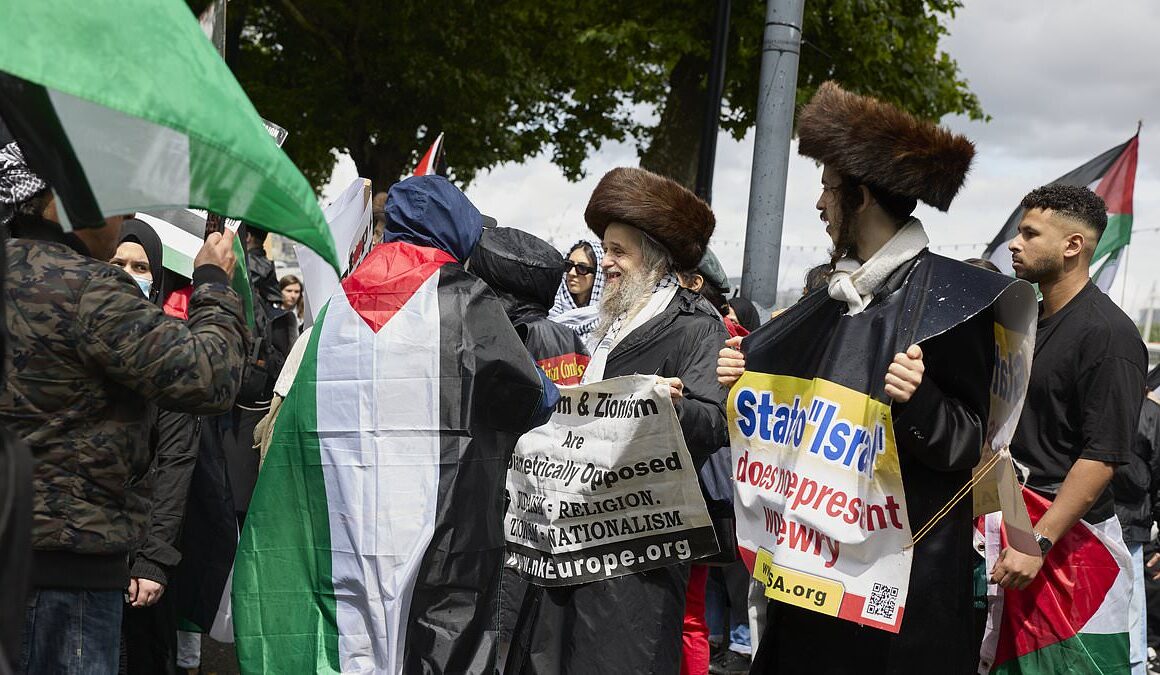You might have thought that the last place you’d find an ultra-Orthodox Jew, complete with long black coat and traditional mink fur hat, would be at one of the pro-Palestine protests that have become an almost weekly event in London.
Packed with keffiyeh-wearing men and women chanting aggressive slogans, such as ‘From the river to the sea, Palestine will be free’, these demonstrations can be hostile environments for anyone who disagrees with the mob.
But, on a march earlier this month, a group of ultra-Orthodox Jews could be seen leading chants calling for the destruction of the state of Israel — to the astonishment of their fellow protesters.
This ten-strong group had trekked in single file for more than two hours, without a map or mobile phone, from their modest synagogue in Stamford Hill, North London, to Parliament Square.
It is a route they’ve come to know well, as — for the past nine months — they have been diligently making this journey on the Jewish Sabbath to express their support for Palestine.

The Neturei Karta – in their traditional garb – mingle with pro-Palestine protesters

The group of ultra-Orthodox Jews could be seen leading chants calling for the destruction of the state of Israel – to the astonishment of their fellow protesters
The men — all members of what has been described as an extremist sect called Neturei Karta — are among some of the most dedicated and controversial advocates for Palestine in the world.
They claim that they are the only ‘authentic Rabbis’ and that all ‘true Jews’ reject the existence of Israel.
But mainstream Jewish figures have condemned the group, dubbing them the ‘Westboro Baptist Church of the Jewish community’ after the Kansas sect most famous for demonstrating against homosexuality under the slogan ‘God hates f*gs’.
While Westboro is thought to have fewer than 100 members, Neturei Karta — which also has outposts in Jerusalem and New York — is said to number several thousand people globally, with hundreds living in London.
They believe that the Holocaust was a punishment from God ‘for the sins’ of Jewish people, that Zionists ‘may have’ collaborated with Hamas to wage the October 7 massacre and that women are biologically destined to stay at home and rear children.
Earlier this year, leaders of Neturei Karta even travelled to Iran to attend the funeral of ex-President Ebrahim Raisi, known as ‘The Butcher of Tehran’, after he was killed in a helicopter crash.
Multiple members of this highly conservative group have also been arrested in recent years for meeting and collaborating with terrorist groups, including Hamas and Palestinian Islamic Jihad, and Iran’s Islamic Revolutionary Guard Corps.
But since war broke out between Israel and Hamas last October, Neturei Karta have found themselves on the frontline of the online propaganda war against Israel, becoming the unlikely faces of Palestinian nationalism.
They are regularly pictured in the media, in traditional Jewish garb and holding signs demanding the state of Israel be dismantled.
Their leaders are regularly invited to college campuses — including University College London, the School of Oriental and Asian Studies and Birmingham University — to participate in protests against Israel.

The ten-strong Neturei Karta group on the July 6 march in London
On Instagram, clips of the group at pro-Palestine marches are widely circulated by Left-wing social media accounts to highlight alleged ‘injustices’ in the region.
In one viral video posted shortly after October 7, which has attracted almost one million views, Neturei Karta leader Rabbi Elhanan Beck asserts: ‘The state of Israel is a rebellion against God.’
Earlier this month — for the first time in almost a decade — this highly insular group opened its doors to Western media and allowed us to visit their synagogue, interview their leaders and accompany them on one of their marches from North London to a pro-Palestine demonstration.
Before our first face-to-face interview, in a flat in Stamford Hill, Rabbi Beck calls (he doesn’t use social media, text or Whatsapp) and requests that, as female journalists, we come to the interview ‘covered’ because he is ‘a religious man’.
It is just one of the many strict rules that govern how females must behave in ultra-Orthodox communities, as we discovered when we interviewed Leah Zitter, 54, one of the few women who has managed to defect from the group, of which more later.
On arrival, we are met by Rabbi Beck and high-profile Neturei Karta activist Haim Sofer and ushered into a small office, its shelves stacked with hundreds of Jewish books or ‘sefarim’.
As we are women, Rabbi Beck — who was born in Jerusalem in 1967 — struggles to meet our gaze.
According to Neturei Karta, God sent the Jews into exile in 70AD. Establishing the state of Israel, they argue, is an unholy rebellion against divine will.
Conveniently for the men, who were both born in Jerusalem, it is not against God’s will for Jews to live in the region — just for the state to exist in its current form.
The men claim to campaign for Palestinian rights and nationalism because they want to show the world that ‘real Jews’ do not support the war in Gaza or the ‘secular’ Israeli state.
But they believe Jews will one day re-establish a state in Israel in a future ‘Messianic era’.
‘[Israel] will be a Jewish Kingdom when the Messiah comes,’ Rabbi Beck tells us, ‘and all the nations of the world will be unified and serve under one God.’

The men are among some of the most dedicated and controversial advocates for Palestine in the world

Neturei Karta leader Rabbi Elhanan Beck, right, and Rabbi Haim Sofer from the Alkham Road synagogue in north London
Several leaders within the group tell us that ‘Zionists’ and ‘Zionism’ are at the root of most of the world’s problems. It is, of course, a common anti-Semitic trope to claim that Jews have undue influence, money and power and manipulate the world for their own ends.
‘The United States is a colony of the Zionist state completely controlled by the Zionists. And so is Great Britain,’ Haim Sofer tells us.
He adds: ‘The Zionist state creates and promotes anti-Semitism. They are benefiting from creating anti-Semitism. Unfortunately, most of the world media is in the hands of the Zionists.’
When directly asked whether he thought Hamas — a proscribed terror group that murdered more than 1,100 Jews on October 7 — was anti-Semitic, Mr Sofer explains: ‘Hamas are absolutely not anti-Semitic. They are anti-Zionists. The Houthis are also not anti-Semitic. [Lebanese militants] Hezbollah too.’
It’s worth pointing out that the official slogan of the Houthis (an Iran-backed rebel group in Yemen) is: ‘God is the greatest, death to America, death to Israel, a curse upon the Jews. Victory to Islam.’
In language that would appall most Jews and delight anti-Semites the world over, Rabbi Beck adds: ‘The 7th of October was very much exaggerated. [And while] we’re not here to support the killing of innocent Jews, [it was] the Zionists who pushed the Palestinians to do it [the massacre].’
Asked if there was any anti-Semitism at the pro-Palestine marches, he said: ‘On the marches, they chant: ‘Judaism yes, Zionism no. The state of Israel must go.’ This is clearly not anti-Semitic.
‘All [the Palestinains] are campaigning for is to get their country back. There is nothing anti-Semitic about this.’
Despite Mr Sofer’s claims, mainstream Jewish leaders have for months complained of rampant anti-Semitism at pro-Palestine marches in London — including the glorification of terrorism.
A spokesperson for the Board of Deputies of British Jews, the national representative body of the UK Jewish community, said: ‘The Neturei Karta, who make up a tiny minority of the Jewish community, are viewed with pity and contempt by most other Jews.
‘Their popularity in extreme anti-Israel circles is based entirely on the fact that they dress the way that many non-Jews see as stereotypically Jewish. This is tokenism at its most abject.’
On Saturday, July 6, we join Neturei Karta on their walk to join the pro-Palestine march.
At around 11am we meet a handful of protesters outside the synagogue in Stamford Hill. As they file down the High Street, taxi drivers honk in admiration and passersby ask for pictures.
‘A lot of people stop us and thank us for expressing our resistance to the genocide in Gaza when we go to the marches,’ Rabbi Beck explains. ‘Many people give us their phone numbers and invite us to speak at their universities or mosques after seeing us.’
When we reach Parliament Hill, Rabbi Beck leads his followers to the front of the march — near the centre stage — and instructs them to stand in a line, on a raised platform, so they can be seen by everyone who walks past.
Almost instantly a sizable crowd gathers around them, admiringly watching and filming as young Jewish children lead chants disavowing the state of Israel.
‘We are against the state of Israel because we are Jews,’ the young boys cry, as people around them cheer and clap.
Obtaining an insider’s account of what life is really like in such a bizarre organisation is well-nigh impossible, as very few manage to summon up the courage to leave and some of those who do are often too traumatised to speak out.
But Leah Zitter has no such qualms. Leah, who was born and raised in the Neturei community in Stamford Hill, claims that strict measures are taken by the group’s leaders to limit their members’ access to the secular world.

Rubble from destroyed buildings line the streets in Khan Yunis on the southern Gaza Strip
No one inside the community is meant to use the internet and most people avoid reading secular books, listening to British music or having any meaningful interaction with people in the outside world.
Secular education is also limited with most of the group being educated inside the community and speaking only Yiddish.
Men spend most of their time studying the Torah while women live highly domesticated lives after entering arranged marriages.
From an early age Leah was taught to demonise Israel: ‘I remember burning the Israeli flag and putting posters on my bedroom window saying we had nothing to do with Israel. I never really understood why.’
Leah says: ‘I would overhear [men] talking about how they had beaten up women who they considered ‘immodest’,’ she says. ‘We weren’t allowed to read or to touch the holy books because we were considered impure.’
In stark contrast to the benign image presented by the community to the outside world, Leah claims her earliest memories were filled with bullying. She was punished when she refused to do things considered normal for girls in the community, such as knitting, sewing or playing with dolls.’
Leah says she knew of girls who were locked in the attic, kicked out of the house, forced to sleep in the garden — or even wander the streets late at night.
‘And even though there were many good and kind people, overall there was no beginning and no end to the mental, physical and emotional abuse I received from people in the community.’
Leah was married off at 21, a notably late age within the Neturei Karta community. ‘Many of the women within Neturei Karta were married at 15, 16,’ she says, ‘and a lot of them didn’t see their husbands until their wedding day.’
Leah did everything within her power to avoid getting forcibly married: ‘I would say all sorts of crazy things so that the man wouldn’t want to marry me — telling him I wanted to open an orphanage in my home and invite people from the streets to live with me.
‘This happened time and again until one day — when I was about 21 years old — flowers, cookies and gifts suddenly started arriving at the house.
‘People started coming up to me and wishing me ‘mazel tov’ or ‘congratulations’. That’s how I found out I was engaged.
‘Shortly before I was to be married my aunt told me that my soon-to-be husband would throw me on the floor and do certain things to me and I would just have to go along with it.
‘That was the closest thing I had to sex education.’
Leah — who is now divorced and working as a research scientist — eventually managed to leave the group. ‘Leaving was a big process. We are told growing up that this is your world, this is your family. That the people out there hate us. That they want to kill us.
‘For a woman, leaving is especially hard; you are given no more than a basic education. You’re not even taught to speak English well. People are very afraid.’
R abbi Beck dismissed allegations that Neturei Karta is an abusive and controlling organsation as ridiculous: ‘Neturei Karta is not even an official organisation with membership, a central location or a leader,’ he said.
‘Neturei Karta is just the name that the world has given to activists who protest against the Zionist movement and its actions.
‘It sounds like Leah has been through a lot in her private life and is trying to blame an entire community for her suffering.’
He added: ‘It’s not surprising to us at all that secular and Zionist organisations are denouncing us. The Board of Deputies, as a non-religious organisation, cannot comment about religious Haredi Jews.
‘In the religious Haredi community, the Neturei Karta activists are well accepted and integrated.’
Despite these protestations, Neturei Karta are a fundamentally radical organisation.
The smiling faces of the young Jewish men and boys on the frontlines of pro-Palestine activism hide the realities of the group — which, its enemies insist, is characterised by abuse, control and brainwashing.
And despite Leah’s brave testimony, Neturei Karta will no doubt be welcomed with open arms at the next pro-Palestine march.







